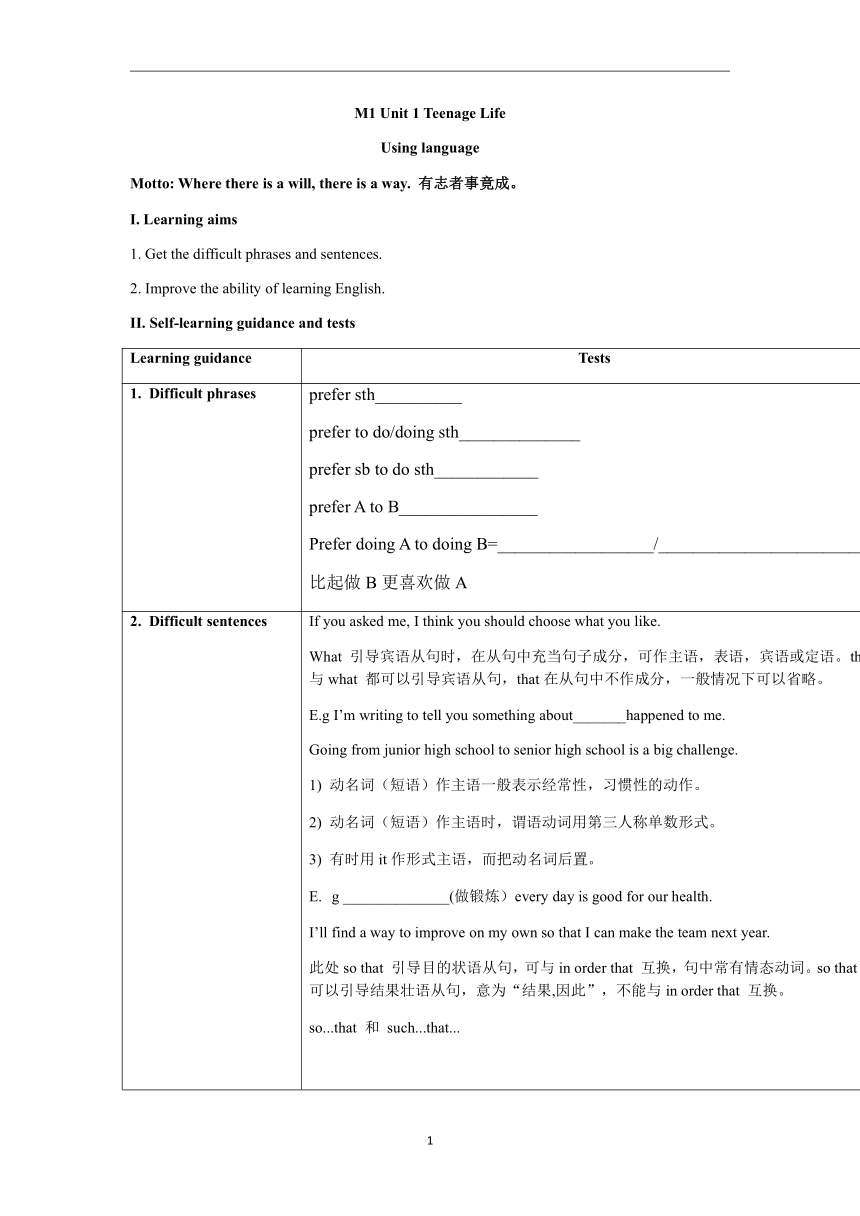人教版(2019)必修第一册Unit1Teenage Life Using language学案(无答案)
文档属性
| 名称 | 人教版(2019)必修第一册Unit1Teenage Life Using language学案(无答案) |  | |
| 格式 | zip | ||
| 文件大小 | 34.7KB | ||
| 资源类型 | 教案 | ||
| 版本资源 | 人教版(2019) | ||
| 科目 | 英语 | ||
| 更新时间 | 2022-01-12 11:46:01 | ||
图片预览

文档简介
M1 Unit 1 Teenage Life
Using language
Motto: Where there is a will, there is a way. 有志者事竟成。
I. Learning aims
1. Get the difficult phrases and sentences.
2. Improve the ability of learning English.
II. Self-learning guidance and tests
Learning guidance Tests
Difficult phrases prefer sth__________ prefer to do/doing sth______________ prefer sb to do sth____________ prefer A to B________________ Prefer doing A to doing B=__________________/_________________________ 比起做B更喜欢做A
Difficult sentences If you asked me, I think you should choose what you like. What 引导宾语从句时,在从句中充当句子成分,可作主语,表语,宾语或定语。that与what 都可以引导宾语从句,that在从句中不作成分,一般情况下可以省略。 E.g I’m writing to tell you something about_______happened to me. Going from junior high school to senior high school is a big challenge. 动名词(短语)作主语一般表示经常性,习惯性的动作。 动名词(短语)作主语时,谓语动词用第三人称单数形式。 有时用it作形式主语,而把动名词后置。 g ______________(做锻炼)every day is good for our health. I’ll find a way to improve on my own so that I can make the team next year. 此处so that 引导目的状语从句,可与in order that 互换,句中常有情态动词。so that 还可以引导结果壮语从句,意为“结果,因此”,不能与in order that 互换。 so...that 和 such...that... adj+a(n)+n(单数) many/few+n(复数 +that 从句 So+ much/little(少)+n(U) a(n)+adj+n(单数) Such+ adj+n(复数) +that 从句 adj+n(U) 巧记:名前such,形副so;多多少少也用so(many,much,little,few);little一词特殊记,“小”用such,“少”用so. So that 引导目的状语和结果状语的区别:1)根据上下文及句子所表达的意思判断;2) 从句前有逗号是结果状语从句,从句中有情态动词是目的状语从句。 E.g: She hurried, so that she caught the bus.___________ I got up early so that I could catch the first bus._________
III. Consolidation
Level A: Fill in the blanks.
Can you __________(推荐) me some new books on this subject
John __________ (毕业) from junior high school, and now he is a senior high school student.
__________ (obvious), the freshman is curious about everything on campus.
There were only three of us who took the _________ (advance) course.
Don’t be shy. You’ll quickly _________________ (习惯于) starting conversations with people.
6. Because of his illness, Peter couldn’t _________________ (追赶上) the rest of the class and fell badly behind.
Level B: Translation
1.我花了两个小时做我的家庭作业。(spend... (in) doing sth. 花费...做...)
I ________________________________________ my homework.
2.我同意你的想法。(agree with 同意...)
_____________________________________________________.
3.我喜欢英语多于数学。(prefer ...to... 喜欢...多于...)
_____________________________________________________.
4.对于他来说学好英语是有可能的。(It’s possible for sb. to do sth. 对于某人来说做某事是可能的)
_____________________________________________________.
Level C: 短文改错.
假定英语课上老师要求同桌之间交换修改作业,请你修改你同桌写的以下作文。文中共有10处语言错误,每句中最多有两处。每处错误仅涉及一个单词的增加、删除或修改。
增加:在缺词处加一个漏字符号(N) ,并在其下面写出该加的词。
删除:把多余的词用斜线(\) 划掉。
修改:在错的词下划一横线,并在该词下面写出修改后的词。
注意: 1.每处错误及其修改均仅限一-词;
2.只允许修改10处,多者(从第11处起)不计分。
Last week our teacher asked us to fill in a questionnaire. One of the questions are: Who will you go in times of the trouble Here are the results. Many students say they will talk to their friend or classmates because they're of the same age and can understand each other. Some will turn out to their parents or teachers for help. Only a little choose to deal with the problem on our own .Their answers also show that they dislike talk to others. They kept very much to themselves. In my opinion, where in trouble, we should seek help from those we trust mostly.
Using language
Motto: Where there is a will, there is a way. 有志者事竟成。
I. Learning aims
1. Get the difficult phrases and sentences.
2. Improve the ability of learning English.
II. Self-learning guidance and tests
Learning guidance Tests
Difficult phrases prefer sth__________ prefer to do/doing sth______________ prefer sb to do sth____________ prefer A to B________________ Prefer doing A to doing B=__________________/_________________________ 比起做B更喜欢做A
Difficult sentences If you asked me, I think you should choose what you like. What 引导宾语从句时,在从句中充当句子成分,可作主语,表语,宾语或定语。that与what 都可以引导宾语从句,that在从句中不作成分,一般情况下可以省略。 E.g I’m writing to tell you something about_______happened to me. Going from junior high school to senior high school is a big challenge. 动名词(短语)作主语一般表示经常性,习惯性的动作。 动名词(短语)作主语时,谓语动词用第三人称单数形式。 有时用it作形式主语,而把动名词后置。 g ______________(做锻炼)every day is good for our health. I’ll find a way to improve on my own so that I can make the team next year. 此处so that 引导目的状语从句,可与in order that 互换,句中常有情态动词。so that 还可以引导结果壮语从句,意为“结果,因此”,不能与in order that 互换。 so...that 和 such...that... adj+a(n)+n(单数) many/few+n(复数 +that 从句 So+ much/little(少)+n(U) a(n)+adj+n(单数) Such+ adj+n(复数) +that 从句 adj+n(U) 巧记:名前such,形副so;多多少少也用so(many,much,little,few);little一词特殊记,“小”用such,“少”用so. So that 引导目的状语和结果状语的区别:1)根据上下文及句子所表达的意思判断;2) 从句前有逗号是结果状语从句,从句中有情态动词是目的状语从句。 E.g: She hurried, so that she caught the bus.___________ I got up early so that I could catch the first bus._________
III. Consolidation
Level A: Fill in the blanks.
Can you __________(推荐) me some new books on this subject
John __________ (毕业) from junior high school, and now he is a senior high school student.
__________ (obvious), the freshman is curious about everything on campus.
There were only three of us who took the _________ (advance) course.
Don’t be shy. You’ll quickly _________________ (习惯于) starting conversations with people.
6. Because of his illness, Peter couldn’t _________________ (追赶上) the rest of the class and fell badly behind.
Level B: Translation
1.我花了两个小时做我的家庭作业。(spend... (in) doing sth. 花费...做...)
I ________________________________________ my homework.
2.我同意你的想法。(agree with 同意...)
_____________________________________________________.
3.我喜欢英语多于数学。(prefer ...to... 喜欢...多于...)
_____________________________________________________.
4.对于他来说学好英语是有可能的。(It’s possible for sb. to do sth. 对于某人来说做某事是可能的)
_____________________________________________________.
Level C: 短文改错.
假定英语课上老师要求同桌之间交换修改作业,请你修改你同桌写的以下作文。文中共有10处语言错误,每句中最多有两处。每处错误仅涉及一个单词的增加、删除或修改。
增加:在缺词处加一个漏字符号(N) ,并在其下面写出该加的词。
删除:把多余的词用斜线(\) 划掉。
修改:在错的词下划一横线,并在该词下面写出修改后的词。
注意: 1.每处错误及其修改均仅限一-词;
2.只允许修改10处,多者(从第11处起)不计分。
Last week our teacher asked us to fill in a questionnaire. One of the questions are: Who will you go in times of the trouble Here are the results. Many students say they will talk to their friend or classmates because they're of the same age and can understand each other. Some will turn out to their parents or teachers for help. Only a little choose to deal with the problem on our own .Their answers also show that they dislike talk to others. They kept very much to themselves. In my opinion, where in trouble, we should seek help from those we trust mostly.
